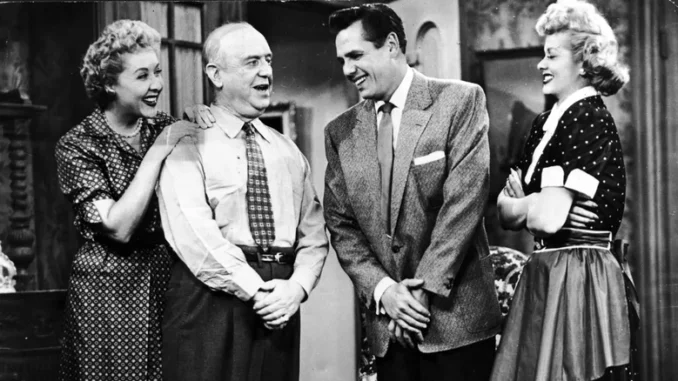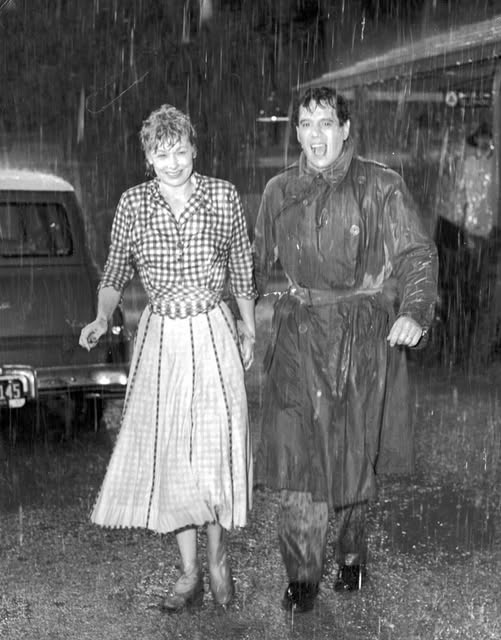
Seventy years after its debut, I Love Lucy remains one of the most beloved and influential television shows ever made. Premiering in 1951 and starring Lucille Ball and Desi Arnaz, the sitcom not only redefined comedy but also reshaped the landscape of television itself.
Today, in an era of streaming giants, viral memes, and fast-paced content, the question persists: why does I Love Lucy still work? Why does a black-and-white sitcom from the 1950s continue to make audiences — from grandparents to Gen Z — laugh out loud?
The answer, simply put, is Lucille Ball’s unmatched comic genius — a blend of physical mastery, emotional intelligence, and fearless authenticity that transcends generations.
A Revolutionary Woman in Comedy
In the early 1950s, the entertainment industry was dominated by men — both behind and in front of the camera. Yet, Lucille Ball stood as a singular force. Her comedic timing, expressive face, and willingness to look utterly ridiculous shattered every expectation of what a woman could be on television.
At a time when female characters were often confined to polite charm or domestic perfection, Lucy Ricardo was chaotic, ambitious, and delightfully flawed. She was every woman’s id — unfiltered, impulsive, and hilariously human.
“Lucy did what no one else dared to do,” said comedy historian Kathleen Brady. “She showed that a woman could be the clown and still be the star.”
From stomping grapes in Italy to stuffing chocolates on a conveyor belt, Lucille Ball’s physical comedy remains legendary. But beyond the slapstick was an undercurrent of emotional truth — Lucy’s constant attempts to break into show business mirrored Ball’s own uphill climb in Hollywood.
Lucille Ball: The Architect of Modern Television
Lucille Ball wasn’t just the face of I Love Lucy — she was the brains behind it. Alongside her husband Desi Arnaz, she co-founded Desilu Productions, the studio that not only produced I Love Lucy but later gave the world Star Trek and Mission: Impossible.
Together, Ball and Arnaz revolutionized how television was made. They pioneered the multi-camera setup, using three cameras to capture live performances from multiple angles — a technique still used in sitcoms today.
They also insisted on filming in front of a live studio audience, giving I Love Lucy its electric, spontaneous energy.
“Every laugh you hear is real,” Ball once said. “The audience was part of the performance. They kept us honest.”
This innovation made I Love Lucy feel alive — a weekly event where timing, audience reaction, and emotional rhythm fused into something magical.
The Comedy of Universality
Part of what keeps I Love Lucy timeless is its universality. The show’s humor never depended on current events, pop culture references, or politics. Instead, it focused on human behavior — ambition, love, jealousy, pride, and the endless struggle to have things go your way.
Whether Lucy is pretending to be part of Ricky’s nightclub act or scheming to buy a new dress, her motivations are relatable: she just wants to feel seen, capable, and loved.
“Lucy’s mischief wasn’t mean-spirited,” explains television scholar Emily Nussbaum. “It was born out of yearning — for recognition, for excitement, for equality.”
That emotional honesty gives I Love Lucy a warmth that endures. Viewers don’t just laugh at Lucy; they root for her.

Breaking Barriers — On and Off Screen
Lucille Ball and Desi Arnaz also made history as the first interracial couple to lead an American sitcom. At the time, Ball’s decision to insist that her real-life Cuban husband play her on-screen spouse was groundbreaking — and risky.
CBS executives initially resisted, fearing backlash from sponsors. Ball refused to compromise. “If Desi can’t play my husband,” she reportedly told them, “then I don’t play Lucy.”
The result was television’s first true power couple — a love story that mirrored and magnified their real marriage. Their chemistry, both comedic and romantic, remains one of the show’s most enduring charms.
Beyond representation, the Arnaz-Ball partnership also redefined what creative control looked like for women. After I Love Lucy, Lucille Ball became the first female head of a major Hollywood studio, overseeing production on groundbreaking shows long after her own sitcom ended.
Still Teaching Comedy Today
Modern comedians continue to study Lucille Ball’s work the way musicians study Mozart. Her sense of rhythm, her commitment to physical truth, and her willingness to lean into awkwardness all serve as a masterclass in comedic performance.
Actors from Tina Fey to Melissa McCarthy and Amy Poehler cite Ball as a foundational influence. Even Nicole Kidman, who portrayed her in Aaron Sorkin’s 2021 biopic Being the Ricardos, described Ball as “a revolutionary spirit — one who risked everything for laughter.”
Film schools and comedy workshops still use I Love Lucy episodes as examples of perfect comic structure: setup, escalation, chaos, and resolution — all executed with precision.
“Lucy didn’t just tell jokes,” said Poehler. “She built universes out of timing.”
Why I Love Lucy Still Works
In an age of irony and cynicism, I Love Lucy offers something rare — pure, joyful sincerity. The show’s humor isn’t mean-spirited or cynical; it’s rooted in love, embarrassment, and the optimism of trying again.
Watching Lucy Ricardo chase her dreams, even when everything goes hilariously wrong, reminds viewers that laughter can be both rebellious and healing.
There’s also comfort in its simplicity. In a world of endless content, I Love Lucy’s clean storytelling and emotional directness feel almost radical.
“It’s timeless because it’s honest,” says critic Richard Roeper. “Every episode is about the human condition — and how ridiculous, wonderful, and exhausting it can be.”
A Legacy That Refuses to Fade
From streaming platforms to TikTok compilations, I Love Lucy continues to find new audiences. Its humor still lands. Its warmth still resonates. And Lucille Ball — the redhead with the unstoppable spirit — remains a beacon for every performer who’s ever dared to take a comedic leap.
As one modern fan recently wrote online:
“Lucy didn’t just make people laugh. She made them brave enough to laugh at themselves.”
Decades later, I Love Lucy isn’t just a relic of television history — it’s proof that genius, heart, and laughter never go out of style.